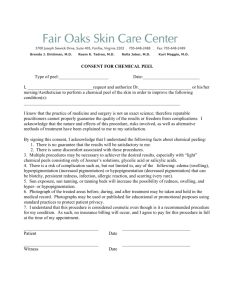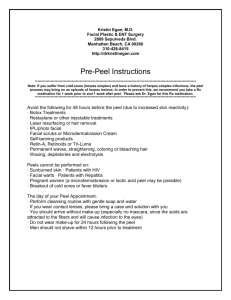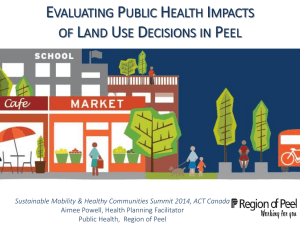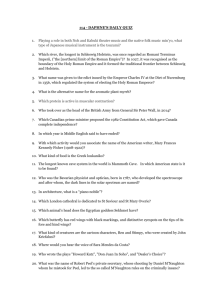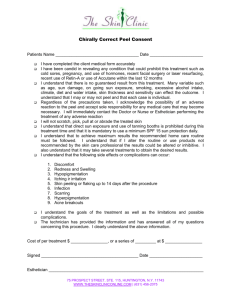SVN3M - Peel District School Board
advertisement
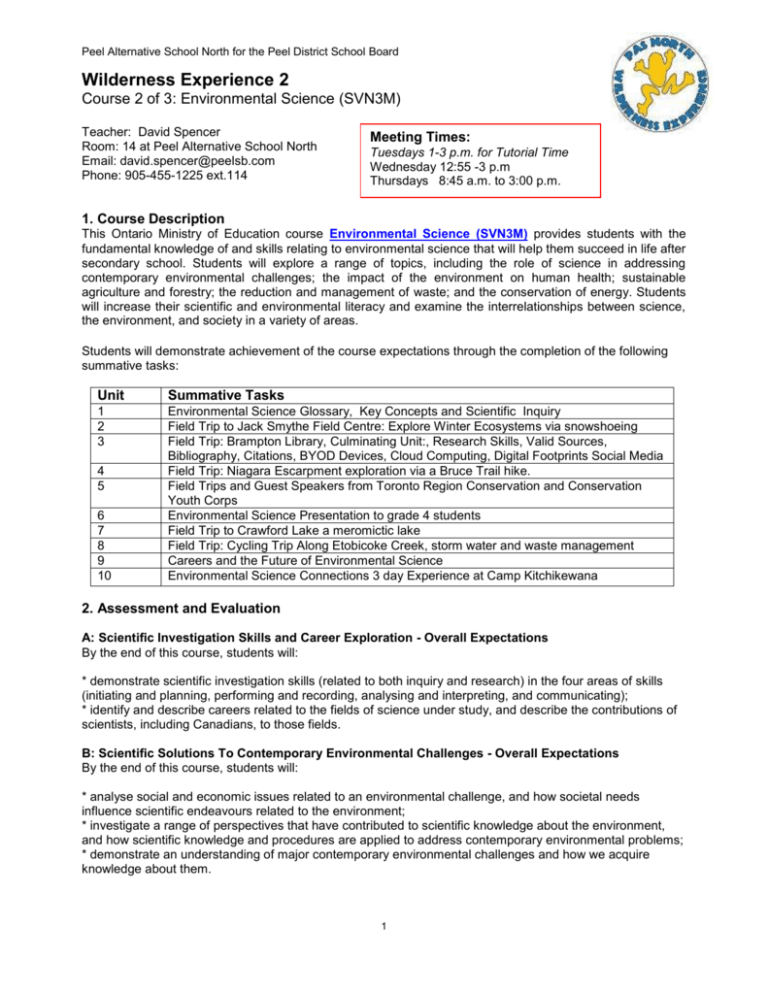
Peel Alternative School North for the Peel District School Board Wilderness Experience 2 Course 2 of 3: Environmental Science (SVN3M) Teacher: David Spencer Room: 14 at Peel Alternative School North Email: david.spencer@peelsb.com Phone: 905-455-1225 ext.114 Meeting Times: Tuesdays 1-3 p.m. for Tutorial Time Wednesday 12:55 -3 p.m Thursdays 8:45 a.m. to 3:00 p.m. 1. Course Description This Ontario Ministry of Education course Environmental Science (SVN3M) provides students with the fundamental knowledge of and skills relating to environmental science that will help them succeed in life after secondary school. Students will explore a range of topics, including the role of science in addressing contemporary environmental challenges; the impact of the environment on human health; sustainable agriculture and forestry; the reduction and management of waste; and the conservation of energy. Students will increase their scientific and environmental literacy and examine the interrelationships between science, the environment, and society in a variety of areas. Students will demonstrate achievement of the course expectations through the completion of the following summative tasks: Unit Summative Tasks 1 2 3 Environmental Science Glossary, Key Concepts and Scientific Inquiry Field Trip to Jack Smythe Field Centre: Explore Winter Ecosystems via snowshoeing Field Trip: Brampton Library, Culminating Unit:, Research Skills, Valid Sources, Bibliography, Citations, BYOD Devices, Cloud Computing, Digital Footprints Social Media Field Trip: Niagara Escarpment exploration via a Bruce Trail hike. Field Trips and Guest Speakers from Toronto Region Conservation and Conservation Youth Corps Environmental Science Presentation to grade 4 students Field Trip to Crawford Lake a meromictic lake Field Trip: Cycling Trip Along Etobicoke Creek, storm water and waste management Careers and the Future of Environmental Science Environmental Science Connections 3 day Experience at Camp Kitchikewana 4 5 6 7 8 9 10 2. Assessment and Evaluation A: Scientific Investigation Skills and Career Exploration - Overall Expectations By the end of this course, students will: * demonstrate scientific investigation skills (related to both inquiry and research) in the four areas of skills (initiating and planning, performing and recording, analysing and interpreting, and communicating); * identify and describe careers related to the fields of science under study, and describe the contributions of scientists, including Canadians, to those fields. B: Scientific Solutions To Contemporary Environmental Challenges - Overall Expectations By the end of this course, students will: * analyse social and economic issues related to an environmental challenge, and how societal needs influence scientific endeavours related to the environment; * investigate a range of perspectives that have contributed to scientific knowledge about the environment, and how scientific knowledge and procedures are applied to address contemporary environmental problems; * demonstrate an understanding of major contemporary environmental challenges and how we acquire knowledge about them. 1 Peel Alternative School North for the Peel District School Board Wilderness Experience 2 Course 2 of 3: Environmental Science (SVN3M) Teacher: David Spencer Room: 14 at Peel Alternative School North Email: david.spencer@peelsb.com Phone: 905-455-1225 ext.114 C: Human Health And The Environment - Overall Expectations By the end of this course, students will: * analyse initiatives, both governmental and non-governmental, that are intended to reduce the impact of environmental factors on human health; * investigate environmental factors that can affect human health, and analyse related data; * demonstrate an understanding of various environmental factors that can affect human health, and explain how the impact of these factors can be reduced. D: Sustainable Agriculture And Forestry - Overall Expectations By the end of this course, students will: * evaluate the impact of agricultural and forestry practices on human health, the economy, and the environment; * investigate conditions necessary for plant growth, including the soil components most suitable for various species, and various environmentally sustainable methods that can be used to promote growth; * demonstrate an understanding of conditions required for plant growth and of a variety of environmentally sustainable practices that can be used to promote growth. E: Reducing And Managing Waste - Overall Expectations By the end of this course, students will: * analyse economic, political, and environmental considerations affecting waste management strategies; * investigate the effectiveness of various waste management practices; * demonstrate an understanding of the nature and types of waste and strategies for its management. F: Conservation Of Energy - Overall Expectations By the end of this course, students will: * assess the impact on society and the environment of the use of various renewable and non-renewable energy sources, and propose a plan to reduce energy consumption; * investigate various methods of conserving energy and improving energy efficiency; * demonstrate an understanding of energy production, consumption, and conservation with respect to a variety of renewable and non-renewable sources. 3. Definitions for Assessment Diagnostic: This refers to assessment activities undertaken at the beginning of a block of learning to determine student's strengths and learning needs in order to plan, modify, and adjust instruction or to provide alternative learning opportunities. Diagnostic assessment data is not used in the determination of grades. Formative: This refers to the ongoing assessment and/or evaluation during the learning process. It is used to monitor student performance and provide feedback in an effort to enhance and improve their performance on summative tasks. As well, recorded formative data may be tracked and monitored to support professional judgement in cases where the body of summative evidence provided by the student has been affected by illness, missed assignments, etc. 2 Peel Alternative School North for the Peel District School Board Wilderness Experience 2 Course 2 of 3: Environmental Science (SVN3M) Teacher: David Spencer Room: 14 at Peel Alternative School North Email: david.spencer@peelsb.com Phone: 905-455-1225 ext.114 Summative: This refers to assessment and/or evaluation that occurs at the conclusion of a block of learning for the purposes of determining the grade. Summative assessment provides the foundation for teachers' professional judgement. These assessments are reported across the four categories of the achievement chart. 4. Assessments Assessments will be distributed across four achievement chart categories using a variety of assessment methods: Categories of Achievement Knowledge / Understanding Thinking / Inquiry Communication Application Category Description Students will develop knowledge of facts, terms, concepts, principles and theories and develop an understanding of the relationship among theories. Students will develop critical and creative thinking skills (reflecting and explaining) and research and inquiry skills (formulating questions). Students will develop communication of information and ideas using language, symbols and visuals and forms for different audiences and purposes. Students will practice the application of ideas and skills in familiar contexts and transfer concepts and procedures to new contexts through presentations, using technology and visual equipment. Each week, students should complete homework, prepare for field trips, reflect on activities and guest speaker presentations. For assignments, presentations and communication skills throughout this Wilderness Experience program, students will be assessed under the following categories. Achievement Category Weightings 50-59% (Level 1) 60-69% (Level 2) 70-79% (Level 3) 80-100% (Level 4) Learning Skills and Work Habits: It is an expectation that each student is assessed not only on their academic achievement but also on their Learning Skills. According to the Growing Success document, these skills include: Responsibility, Organization, Independent Work, Collaboration, Initiative and SelfRegulation. Each of these six learning skills will be evaluated on the report card as E – Excellent, G – Good, S – Satisfactory or N – Needs Improvement. The development and consistent practice of these Learning Skills and Work Habits will positively influence the student’s academic achievement. Experiential Education: During our numerous outdoor experiential field trips, we will be away from the school for the entire day. Students need to act responsibly, commit to attending all field trips and prepare themselves adequately. At home, students will need to prepare and pack their own lunches the day before each field trip. Students will also need to dress appropriately for hot or cold weather conditions, wear sun screen, sunglasses, bring drinking water and doctor prescribed medication. Assessment Expectations: To earn a credit students have the responsibility to submit sufficient evidence of their understanding within established deadlines. It is in the student's best interest to submit evidence of learning at every opportunity that is provided, so that his/her grade accurately reflects what was learned. In 3 Peel Alternative School North for the Peel District School Board Wilderness Experience 2 Course 2 of 3: Environmental Science (SVN3M) Teacher: David Spencer Room: 14 at Peel Alternative School North Email: david.spencer@peelsb.com Phone: 905-455-1225 ext.114 the event that a student produces insufficient evidence in the key understandings for the course, the entire credit is at stake. It is a very serious matter for a student to miss opportunities to demonstrate understanding through assessment. One of the consequences of missing an assessment is that the student may be assigned an Incomplete (I) for that task. If the student fails to provide a sufficient body of assessment evidence to the teacher, the entire credit may be Incomplete. Deadlines: Some deadlines are negotiable, some are absolute. If the student does not complete or submit work on either an absolute or a negotiated deadline, that work will be considered incomplete. The student should seek assistance from the teacher when unable to complete the task due to insufficient knowledge or skill. It is the responsibility of the student to plan ahead and to take action and negotiate an alternate deadline in circumstances when he/she is unable to complete the task on time. Academic Honesty It is expected that students complete their own work in a transparent honest manner. Plagiarism will not be tolerated. “Plagiarism is the action of taking and using, as one’s own, the thoughts, writings or inventions of another. It could be an idea, design, passage or work. Plagiarism also exists if a student copies word for word. Plagiarism of ideas also exists if a student takes and uses an idea without giving proper annotation (i.e. to note the author or source of the information including the Internet). Plagiarism also extends to submitting the work of friends, peers, and/or parents as your own” (Peel Alternative School Student Handbook). Students found to have plagiarized will have to admit their error, redo the assignment and may receive a mark of zero. Mark Breakdown Term Work: 70% Final Evaluation: 30% (15% Culminating Unit + 15% Summative Assessment) Student and Parent Agreement I have read the above course information and agree to follow and meet the above expectations. Parent Name ---------------------------------------------Please Print ------------------------------------------Parent Signature Student Name Student Number -------------------------------------------Please Print -------------------------------------------Student Signature 4 -----------------------------Please Print ----------------------------------------Date (DD/MM/YYYY)
